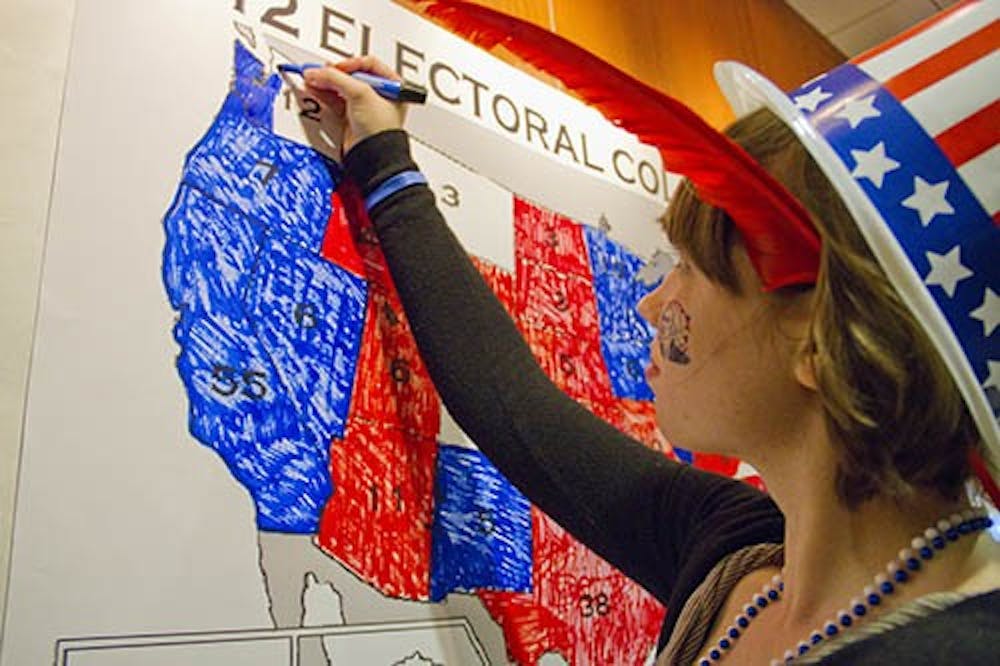College-age voters flooded the election polls in 2008, but a recent study shows not as many returned in 2012.
The Center for Information & Research on Civic Learning and Engagement reported on May 10 that participation among voters younger than 25 in the 2008 election was the highest it had been in 30 years, but fell by more than 1.1 million in 2012.
Brandon Waite, an assistant political science professor, said there are many reasons behind the decrease in young voters.
“A lot of people coming out of college are still having a lot of trouble finding jobs,” Waite said. “Four years after graduating college and you’re still working a part-time or a menial job, it’s difficult to maintain your enthusiasm about American politics.”
Ariel Lee, a senior political science major, said Ball State’s campus wasn’t as politically rallied as she had expected in 2012, but it was still very active.
“There were a lot of people trying to get others registered, which I thought was really cool,” she said. “There didn’t seem to be a lot of partisan fighting, which I thought was really nice.”
She said the social aspect of campus also encourages young people to vote.
“I think people who are in college have the chance to talk with people their own age and interests,” she said. “We can rally ourselves to be interested in politics and things that are going on in the world, so it just makes it a bit easier.”
Sydney Hellgeth, a sophomore animation major, said she felt like she made a change in the country when she voted.
“As soon as you’re 18 and you have the opportunity, I think it’s a good thing and you should do it,” she said. “If people don’t want to, it’s their opinion. If you want to have a say in what’s going to happen in our world, I think you should vote.”
PRESIDENT OBAMA
Obama’s support from voters younger than 30-years-old dropped 2.4 million votes in 2012 from 2008.
His strong Facebook presence in 2008 reached out to younger voters, but Waite said its impact may have been weakened in the most recent election because it was no longer a new outlet.
“One of the things that we see now is that my grandmother is on Facebook,” he said. “The demographics have changed. So while the campaigns are still heavily using social networks, it is now tapping a much broader demographic, not just young people. As a result, the pronounced effect on young people has been diluted.”
Waite said Obama also may have lost voters because when they look at incumbent presidents, they often see “diminished expectations.” He said Obama’s stress on hope and change may have been too promising for novice voters.
“We still have all of these things that he really ran on in 2008 that are still not fully implemented or haven’t made progress on,” he said. “I think there are a lot of younger voters who felt let down and disenchanted with the political process like they had been before. You have this uptick in hope and change, and then it doesn’t happen on the timeline that they expect it to happen on.”
Bill Clinton and Jimmy Carter both had a reduced number of youth voters during their second runs for presidency.
WOMEN
Young women have been more likely than young men to vote since 1972. Women younger than 30 had a higher voter turnout since then,including the last election, when they were 7.1 percent more likely of voting than men in the same age group.
Waite said social and economic factors have helped lead to higher female participation in politics.
“I think that one of the things that we saw from the ‘70s to now is that as more women enter the workforce, they started paying far greater attention and wanting to have a say in policy as well,” he said. “I think if we do see Hillary Clinton run, you’re going to see a major uptick among women.”
He said abortion is also an issue that has influenced more young women to join the political process.
“Given the nature of reproductive politics, it’s not surprising that women are engaged in that policy on both sides of the issue,” Waite said.
THE FUTURE
An important thing to note in the studies of voters under 25 is that in different elections the group is composed of largely new individuals.
“Every four years our definition of youth voters changes who we’re talking about,” Waite said. “Those 18- to 24-year-olds are now 28- to 34-year-olds, so we’re talking about new demographic of young voters every new election cycle.”
Waite said the future of political parties and elections are hard to gauge just by looking at the next generation, but liberal strains are likely to gain strength.
“I think one of the things we’re going to see is that it’s only going to get more interesting as some of these political wins change on some of these issues,” he said.
Still, Waite said it is important for young people to vote.
“My one advice to young voters or people of age to vote is to actually vote,” he said. “I think there is something about going and participating in your first election and really every election after that. You really have to actually do it. Once you do it I think you will understand why everyone else thinks it’s so important.”


